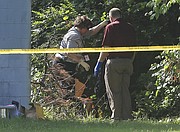A New Boston, Texas, man sentenced to two life sentences plus 20 years for child sex abuse at the end of a Bowie County jury trial last summer is getting a second shot at justice.
The 6th District Court of Appeals headquartered in Texarkana tossed out the convictions and sentences assessed 61-year-old Donald Harrell Jr. last August in an opinion issued Thursday. Harrell was found guilty of two counts of aggravated sexual assault of a child and a single count of indecency with a child by contact and given the maximum possible punishment on each for alleged misconduct with a 9-year-old niece in 2013.
At trial the jury heard testimony not only from the girl he was convicted of abusing, but from the child of a neighbor who claimed Harrell behaved inappropriately with her as well. To introduce the testimony of the second alleged victim, the state argued that Harrell had put forth the defense that he was impotent and void of sexual desire and therefore incapable of committing the crimes. The state argued that the other girl's testimony was admissible to rebut that defense. Following a hearing outside the jury's presence, 5th District Judge Bill Miller sided with the state and allowed the second girl to testify.
The higher court's opinion states that the judge erred in allowing the neighbor's testimony. For a second alleged victim to testify, the defense must have presented a defensive theory that would make it impossible for Harrell to commit the offenses with which he is charged. The 6th's opinion points out that the legal definition of aggravated sexual assault of a child doesn't require that a defendant be capable of sexual performance but only of sexual molestation.
The higher court's opinion states that Harrell's testimony that he suffered from physical ailments and disease that required impotence-producing medications didn't amount to a defense against the crimes with which Harrell was charged. That means the impotence claim couldn't be used as legal justification to introduce the other girl's testimony to refute it.
The higher court further found that testimony concerning Harrell's sexual desire was elicited by the state during its cross examination of Harrell and not by the defense.
"It is clear that any question of the absence of a lack of sexual desire on Harrell's part was raised by the state. Extraneous evidence is not admissible to rebut a defensive issue elicited by the state on its cross-examination. Further, this testimony shows that although Harrell claimed no sexual desire at the time of trial, he acknowledged that he had sexual desire as late as October 2015. There is no testimony that he lacked sexual desire at the time of the alleged sexual assaults," the opinion states.
Harrell's case has been sent back to Miller's court for a new trial.


